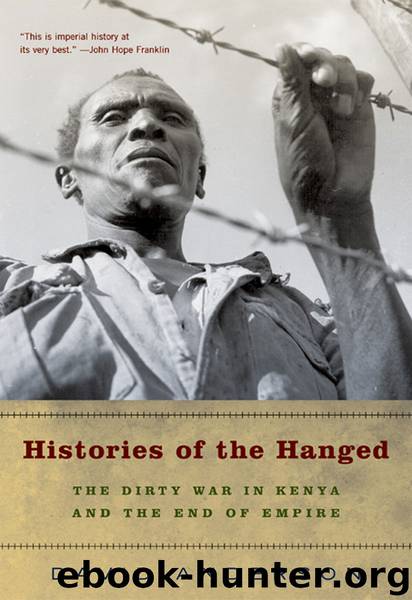Histories of the Hanged by David Anderson

Author:David Anderson
Language: eng
Format: epub
Publisher: W. W. Norton & Company
Published: 2005-11-19T16:00:00+00:00
Terrorizing the Tai-tai
Nairobi’s number one tai-tai was Tom Mbotela. As a member of the executive committee of the KAU and as a senior official on Nairobi’s African Advisory Council, Mbotela had watched the rise of radical politics in Eastlands with growing unease from 1945 onwards. A nationalist, but also a conservative, he feared both the ethnic particularism of Kikuyu radicalism and its disregard for status and authority. The subversive intent of the radical Muhimu leadership was clear to him, and he had bitterly opposed Peter Mbiyu Koinange’s efforts to incorporate the Nairobi militants within the KAU. Koinange had hoped to broaden the party’s popular appeal; instead, he had given the gloss of legitimacy to men who preached violence. Radical leaders such as Eluid Mutonyi and Fred Kubai could certainly harness mass support, but Mbotela knew from his long experience in Eastlands that they would bring nothing but trouble.
Mbotela fought hard to thwart the influence of these dangerous radicals. When they organized the general strike in 1950, Mbotela opposed it. When they called for a boycott of the celebrations to mark Nairobi’s achievement of city status, Mbotela refused to comply. The next week there had been an attempt made upon his life. His moderate colleague, Muchohi Gikonyo, was fortunate to survive another murderous assault just a few days later. It was Kubai, along with an accomplice, whom the police eventually charged with Gikonyo’s attempted murder. Though his friend was convicted, after having spent nine months on remand Kubai was acquitted of the charge. In releasing Kubai the judge did little to disguise his sense that the case against him had been ‘one of the gravest suspicion’.31
After this, Mbotela resigned from the KAU and spoke out against the militants with increased vigour, telling his African audiences that oaths of all kinds were divisive to the nationalist cause and that Mau Mau was an evil and illegitimate movement that they should oppose.32 He eventually paid for his principles with his life. One month into the Emergency, on the evening of 26 November, Mbotela was stabbed and hacked down in a Nairobi street as he walked home from a mayoral reception. His body lay in the gutter, close to a busy thoroughfare in Shauri Moyo, for nearly twelve hours before a European motorist, passing the scene on his way to work, noticed the corpse and stopped.33 No African had dared go near the body. It was an undignified end for a brave and resolute nationalist. More than any other African politician of his generation, Mbotela had stood firm for constitutional methods and moderate views. He had opposed violence and publicly condemned those who supported Mau Mau. His murder was symbolic of the death of moderation in African politics. It sent a chill through other middle-class urban Africans, whom the colonial state was so keen to nurture but whom they could do so little to protect.
By the time of Mbotela’s killing, the forces of Mau Mau already held Eastlands in their grip. Oathing ceremonies organized
Download
This site does not store any files on its server. We only index and link to content provided by other sites. Please contact the content providers to delete copyright contents if any and email us, we'll remove relevant links or contents immediately.
| Arms Control | Diplomacy |
| Security | Trades & Tariffs |
| Treaties | African |
| Asian | Australian & Oceanian |
| Canadian | Caribbean & Latin American |
| European | Middle Eastern |
| Russian & Former Soviet Union |
The Secret History by Donna Tartt(16635)
The Social Justice Warrior Handbook by Lisa De Pasquale(11490)
Thirteen Reasons Why by Jay Asher(7794)
This Is How You Lose Her by Junot Diaz(5779)
Weapons of Math Destruction by Cathy O'Neil(5039)
Zero to One by Peter Thiel(4828)
The Myth of the Strong Leader by Archie Brown(4792)
Promise Me, Dad by Joe Biden(4451)
Beartown by Fredrik Backman(4423)
Stone's Rules by Roger Stone(4418)
How Democracies Die by Steven Levitsky & Daniel Ziblatt(4401)
The Fire Next Time by James Baldwin(4345)
100 Deadly Skills by Clint Emerson(4080)
A Higher Loyalty: Truth, Lies, and Leadership by James Comey(4034)
Rise and Kill First by Ronen Bergman(4013)
The David Icke Guide to the Global Conspiracy (and how to end it) by David Icke(3884)
The Farm by Tom Rob Smith(3873)
Secrecy World by Jake Bernstein(3785)
The Doomsday Machine by Daniel Ellsberg(3734)
